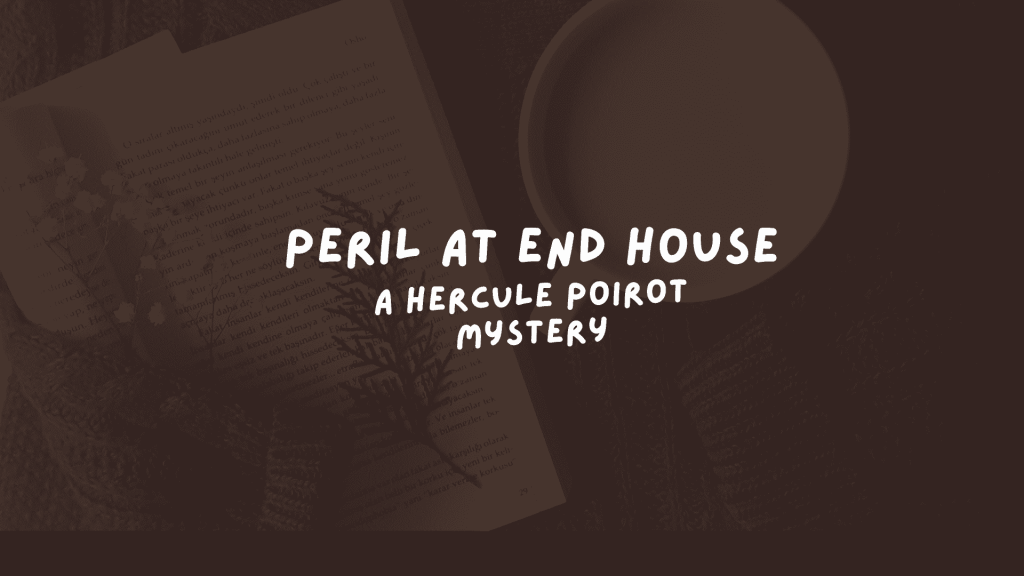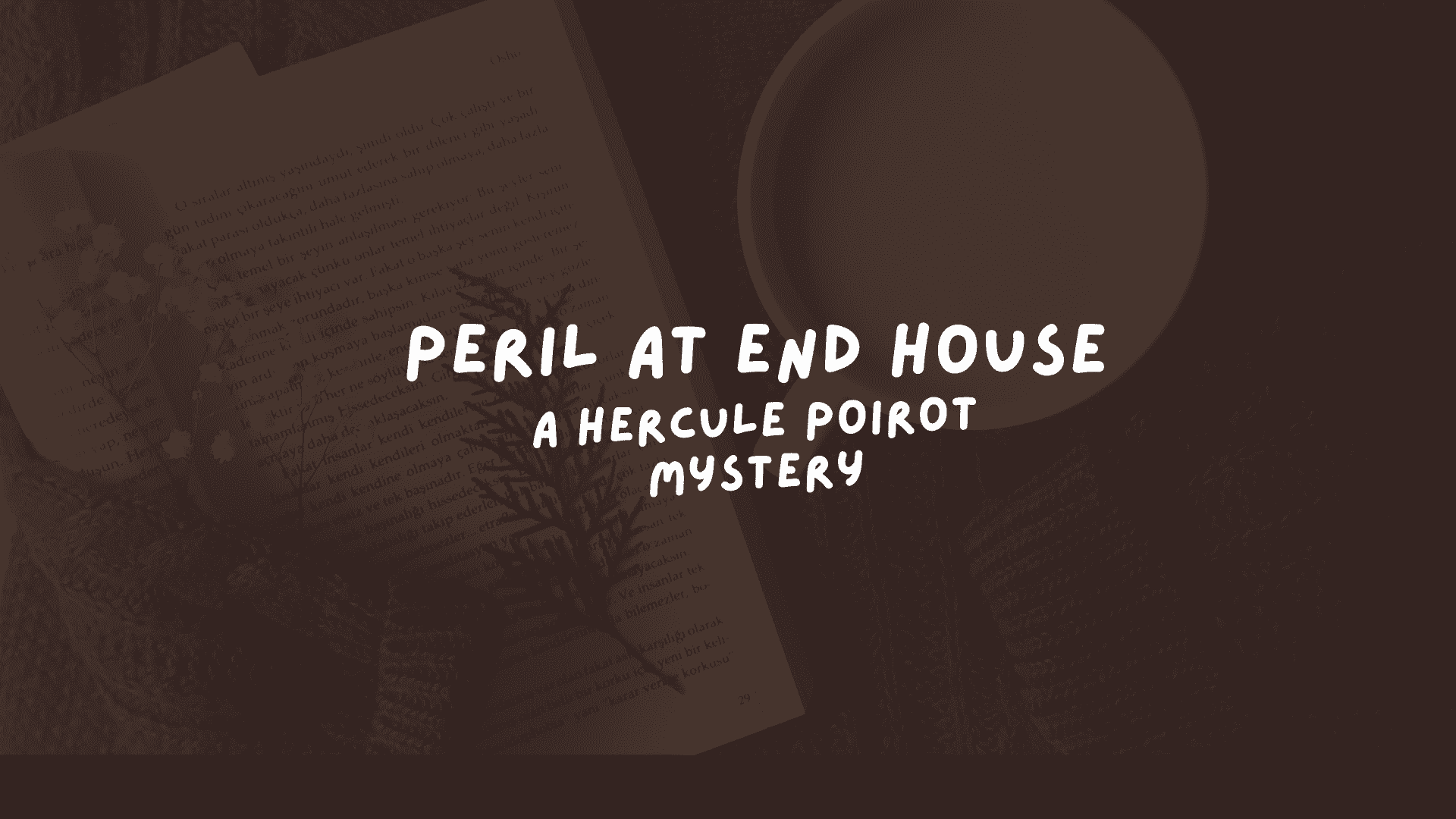Peril at End House Pdf Chapter-17: A Box of Chocolates All the way to the nursing home Poirot murmured and muttered to himself. He was full of self-reproach.
‘I should have known,’ he groaned. ‘I should have known! And yet, what could I do? I took every precaution. It is impossible-impossible. No one could get to her! Who has disobeyed my orders?’
At the nursing home, we were shown a little room downstairs, and after a few minutes, Dr. Graham came to us. He looked exhausted and white.
‘She’ll do,’ he said. ‘It’s going to be all right. The trouble was knowing how much she’d taken off the damned stuff.’
‘What was it?’
‘Cocaine.’
‘She will live?’
‘Yes, yes, she’ll live.’
‘But how did it happen? How did they get at her? Who has been allowed in?’ Poirot fairly danced with impotent excitement.
‘Nobody has been allowed in.’

‘Impossible.’
‘It’s true.’
‘But then-‘
‘It was a box of chocolates.’
‘Ah! Sacré. And I told her to eat nothing-nothing -that came from outside.’
‘I don’t know about that. It’s hard work keeping a girl from a box of chocolates. She only ate one, thank goodness.’
‘Was the cocaine in all the chocolates?’ ‘
No. The girl ate one. There were two others in the top layer. The rest were all right.’
‘How was it done?’
‘Quite clumsily. Chocolate cut in half-the cocaine mixed with the filling and the chocolate stuck together again. Amateurishly. What you might call a homemade job.’
Poirot groaned.
‘Ah! if I knew-if I knew. Can I see Mademoiselle?’
‘If you come back in an hour I think you can see her,’ said the doctor. ‘Pull yourself together, man. She isn’t going to die.’
For another hour we walked the streets of St Loo. I did my best to distract Poirot’s mind-pointing out to him that all was well, that, after all, no mischief had been done.
But he only shook his head, and repeated at intervals: ‘I am afraid, Hastings, I am afraid…’
And the strange way he said it made me, too, feel afraid.
Once he caught me by the arm.
‘Listen, my friend. I am all wrong. I have been all wrong from the beginning.’
‘You mean it isn’t the money-‘
‘No, no, I am right about that. Oh, yes. But that two-it is too simple-too easy,. There is another twist still. Yes, there is something!’
And then in an outburst of indignation: ‘Ah! cette petite! Did I not forbid her? Did I not say, “Do not touch anything from outside?” And she disobeys me-me, Hercule Poirot. Are not four escapes from death enough for her? Must she take a fifth chance? Ah, c’est in oui!’
At last, we made our way back. After a brief wait, we were conducted upstairs.
Nick was sitting up in bed. The pupils of her eyes were widely dilated. She looked feverish and her hands kept twitching violently.
‘At it again,’ she murmured.
Poirot experienced real emotion at the sight of her. He cleared his throat and took her hand in his.
‘Ah! Mademoiselle-Mademoiselle.’
‘I shouldn’t care,’ she said, defiantly, ‘if they had got me this time. I’m sick of it all-sick of it!’
‘Pauvre petite!’
‘Something in me doesn’t like to give them best!’
‘That is the spirit-le sport-you must be the good sport, Mademoiselle.’
‘Your old nursing home hasn’t been so safe after all,’ said Nick.
‘If you had obeyed orders, Mademoiselle-‘
She looked faintly astonished.
‘But I have.’
‘Did I not impress upon you that you were to eat nothing that came from outside?’
‘No more I did.’
‘But these chocolates-‘
‘Well, they were all right. You sent them.’
‘What is that you say, Mademoiselle?’
‘You sent them!’
‘Me? Never. Never anything of the kind.’
‘But you did. Your card was in the box.’
‘What?’
Nick made a spasmodic gesture toward the table by the bed. The nurse came forward.
‘You want the card that was in the box?’
‘Yes, please, nurse.’
There was a moment’s pause. The nurse returned to the room with it in her hand.
‘Here it is.’
I gasped. So did Poirot. For on the card, in flourishing handwriting, were written the same words that I had seen Poirot inscribe on the card that accompanied the basket of flowers.
‘With the Compliments of Hercule Poirot.’
‘Sacré tonnerre!’
‘You see,’ said Nick, accusingly.
‘I did not write this!’ cried Poirot.
‘What?’
‘And yet,’ murmured Poirot, ‘and yet it is my handwriting.’
‘I know. It’s exactly the same as the card that came with the orange carnations. I never doubted that the chocolates came from you.’
Poirot shook his head.
‘How should you doubt? Oh! the devil! The clever, cruel devil! To think of that! Ah! but he has genius, this man, genius! “With the Compliments of Hercule Poirot.” So simple. Yes, but one had to think of it. And I-I did not think. I omitted to foresee this move.’
Nick moved restlessly.
‘Do not agitate yourself, Mademoiselle. You are blameless-blameless. It is I that am to blame, miserable imbecile that I am! I should have foreseen this move. Yes, I should have foreseen it.’
His chin dropped on his breast. He looked at the picture of misery.
‘I really think-‘ said the nurse.
She had been hovering nearby, a disapproving expression on her face.
‘Eh? Yes, yes, I will go. Courage, Mademoiselle. This is the last mistake I will make. I am ashamed, desolated-I have been tricked, outwitted-as though I were a little schoolboy. But it shall not happen again. No. I promise you. Come, Hastings.’
Poirot’s first proceeding was to interview the matron. She was, naturally, terribly upset over the whole business.
‘It seems incredible to me, M. Poirot, absolutely incredible. That a thing like that should happen in my nursing home.’
Poirot was sympathetic and tactful. Having soothed her sufficiently, he began to inquire into the circumstance of the arrival of the fatal packet. Here, the matron declared, he would do best to interview the orderly who had been on duty at the time of its arrival.
The man in question, whose name was Hood, was a stupid but honest-looking young fellow of about twenty-two. He looked nervous and frightened. Poirot put him at his ease, however.
‘No blame can be attached to you,’ he said kindly. ‘But I want you to tell me exactly when and how this parcel arrived.’
The orderly looked puzzled.
‘It’s difficult to say, sir,’ he said, slowly. ‘Lots of people come and inquire and leave things for the different patients.’
‘The nurse says this came last night,’ I said. ‘About six o’clock.’
The lad’s face brightened.
‘I do remember, now, sir. A gentleman brought it.’
‘A thin-faced gentleman-fair-haired?’
‘He was fair-haired-but I don’t know about thin-faced.’
‘Would Charles Vyse bring it himself?’ I murmured to Poirot.
I had forgotten that the lad would know a local name.
‘It wasn’t Mr. Vyse,’ he said. ‘I know him. It was a bigger gentleman-handsome looking- came in a big car.’
‘Lazarus,’ I exclaimed.
Poirot shot me a warning glance and I regretted my precipitance.
‘He came in a large car and he left this parcel. It was addressed to Miss Buckley?’
‘Yes, sir.’
‘And what did you do with it?’
‘I didn’t touch it, sir. The nurse took it up.’
‘Quite so, but you touched it when you took it from the gentleman, n’est ce pas?’
‘Oh! that, yes, of course, sir. I took it from him and put it on the table.’
‘Which table? Show me, if you please.’
The orderly led us into the hall. The front door was open. Close to it, in the hall, was a long marble-topped table on which lay letters and parcels.
‘Everything that comes is put on here, sir. Then the nurses take things up to the patients.’
‘Do you remember what time this parcel was left?’
‘Must have been about five-thirty or a little after. I know the post had just been, and that’s usually at about half-past five. It was a pretty busy afternoon, a lot of people leaving flowers and coming to see patients.’
‘Thank you. Now, I think, we will see the nurse who took up the parcel.’
This proved to be one of the probationers, a fluffy little person all agog with excitement. She remembered taking the parcel up at six o’clock when she came on duty.
‘Six o’clock,’ murmured Poirot. ‘Then it must have been twenty minutes or so that the parcel was lying on the table downstairs.’
‘Pardon?’
‘Nothing, Mademoiselle. Continue. You took the parcel to Miss Buckley?’
‘Yes, there were several things for her. There was this box and some flowers and also sweet peas from Mr. and Mrs. Croft, I think. I took them up at the same time. And there was a parcel that had come by post-and curiously enough that was a box of Fuller’s chocolates also.’
‘Comment? A second box?’
‘Yes, rather a coincidence. Miss Buckley opened them both. She said: “Oh! what a shame. I’m not allowed to eat them.” Then she opened the lids to look inside and see if they were both just the same, and your card was in one and she said, “Take the other impure box away, nurse. I might have got them mixed up.” Oh! dear, whoever would have thought of such a thing? Seems like an Edgar Wallace, doesn’t it?’
Poirot cut short this flood of speech.
‘Two boxes, you say? From whom was the other box?’
‘There was no name inside.’
‘And which was the one that came-that had the appearance of coming from me? The one by post or the other?’
‘I declare now-I can’t remember. Shall I go up and ask Miss Buckley?’
‘If you would be so amiable.’
She ran up the stairs.
‘Two boxes,’ murmured Poirot. ‘There is confusion for you.’
The nurse returned breathlessly.
‘Miss Buckley isn’t sure. She unwrapped them both before she looked inside. But she thinks it wasn’t the box that came by post.’
‘Eh?’ said Poirot, a little confused.
‘The box from you was the one that didn’t come by post. At least she thinks so, but she isn’t quite sure.’
‘Diable!’ said Poirot, as we walked away. ‘Is no one ever quite sure? In detective books-yes. But life-real life is always full of muddling. Am I sure, myself, about anything at all? No, no-a thousand times, no.’
‘Lazarus,’ I said.
‘Yes, that is a surprise, is it not?’
‘Shall you say anything to him about it?’
‘Assuredly. I shall be interested to see how he takes it. By the way, we might as well exaggerate the serious condition of Mademoiselle. It will do no harm to let it be assumed that she is at death’s door. Do you comprehend? The solemn facies is admirable. You resemble closely an undertaker. C’est tout à fait bien.’
We were lucky in finding Lazarus. He was bending over the bonnet of his car outside the hotel.
Poirot went straight up to him.
‘Yesterday evening, Monsieur Lazarus, you left a box of chocolates for Mademoiselle,’ he began without preamble.
Lazarus looked rather surprised.
‘Yes?’
‘That was very amiable of you.’
‘As a matter of fact, they were from Freddie, from Mrs. Rice. She asked me to get them.’
‘Oh! I see.’
‘I took them round in the car.’
‘I comprehend.’
He was silent for a minute or two and then said: ‘Madame Rice, where is she?’
‘I think she’s in the lounge.’
We found Frederica having tea. She looked up at us with an anxious face.
‘What is this I hear about Nick being taken ill?’
‘It is a most mysterious affair, Madame. Tell me, did you send her a box of chocolates yesterday?’
‘Yes. At least she asked me to get them for her.’
‘She asked you to get them for her?’
‘Yes.’
‘But she was not allowed to see anyone. How did you see her?’
‘I didn’t. She telephoned.’
‘Ah! And she said-what?’
‘Would I get her a two-pound box of Fuller’s chocolates.’
‘How did her voice sound weak?’
‘No-not at all. Quite strong. But different somehow. I didn’t realize it was she speaking at first.’
‘Until she told you who she was?’
‘Yes.’
‘Are you sure, Madame, that it was your friend?’
Frederica looked startled.
‘I-I-why, of course, it was. Who else could it have been?’
‘That is an interesting question, Madame.’
‘You don’t mean-‘
‘Could you swear, Madame, that it was your friend’s voice apart from what she said?’
‘No,’ said Frederica, slowly, ‘I couldn’t. Her voice was certainly different. I thought it was the phone or perhaps being ill…’
‘If she had not told you who she was, you would not have recognized it?’
‘No, no, I don’t think I should. Who was it, M. Poirot? Who was it?’
‘That is what I mean to know, Madame.’
The graveness of his face seemed to awaken her suspicions.
‘Is Nick-has anything happened?’ she asked, breathlessly.
Poirot nodded.
‘She is ill-dangerously ill. Those chocolates, Madame-were poisoned.’
‘The chocolates I sent her? But that’s impossible-impossible!’
‘Not impossible, Madame, since Mademoiselle is at death’s door.’
‘Oh, my God.’ She hid her face in her hands, then raised it white and quivering. ‘I don’t understand I don’t understand. The other, yes, but not this. They couldn’t be poisoned. Nobody ever touched them but me and Jim. You’re making some dreadful mistake, M. Poirot.’
‘It is not I that make a mistake-even though my name was in the box.’
She stared at him blankly.
‘If Mademoiselle Nick dies-‘ he said, and made a threatening gesture with his hand.
She gave a low cry.
He turned away, and taking me by the arm, went up to the sitting room.
He flung his hat on the table.
‘I understand nothing-but nothing! I’m in the dark. I am a little child. Who stands to gain by Mademoiselle’s death? Madame Rice. Who buys the chocolates and admits it and tells a story of being rung up on the telephone that cannot hold water for a minute? Madame Rice. It is too simple-too stupid. And she is not stupid-no.’
‘Well, then-‘
‘But she takes cocaine, Hastings. I am certain she takes cocaine. There is no mistaking it. And there was cocaine in those chocolates. And what did she mean when she said, “The other, yes, but not this.” It needs explaining, that! And the sleek M. Lazarus-what is he doing in all this? What does she know, Madame Rice? She knows something. But I cannot make her speak. She is not of those you can frighten into speech. But she knows something, Hastings. Is her tale of the telephone true, or did she invent it? If it is true whose voice was it?
‘I tell you, Hastings. This is all very black-very black.’
‘Always darkest before dawn,’ I said reassuringly.
He shook his head.
‘Then the other box that came by post. Can we rule that out? No, we cannot, because Mademoiselle is not sure. It is an annoyance, that!’
He groaned.
I was about to speak when he stopped me.
‘No, no. Not another proverb. I cannot bear it. If you would be the good friend the good helpful friend-‘
‘Yes,’ I said eagerly.
‘Go out, I beg of you, and buy me some playing cards.’
I stared.
‘Very well,’ I said coldly.
I could not but suspect that he was making a deliberate excuse to get rid of me.
Here, however, I misjudged him. That night, when I came into the sitting room at about ten o’clock, I found Poirot carefully building card houses-and I remembered!
It was an old trick of his-soothing his nerves. He smiled at me.
‘Yes-you remember. One needs precision. One card on another-so-in exactly the right place and that supports the weight of the card on top and so on, up and up. Go to bed, Hastings. Leave me here, with my house of cards. I clear the mind.’
It was about five in the morning when I was shaken awake.
Poirot was standing by my bedside. He looked pleased and happy.
‘It was very just what you said, mon ami. Oh! it was very just. More, it was spiritual!’
I blinked at him, being imperfectly awake.
‘Always darkest before dawn-that is what you said. It has been very dark-and now it is dawn.’
I looked out the window. He was perfectly right.
‘No, no, Hastings. In the head! The mind! The little grey cells!’
He paused and then said quietly: ‘You see, Hastings, Mademoiselle is dead.’
‘What?’ I cried, suddenly wide awake.
‘Hush-hush. It is as I say. Not really-bien entendu-but it can be arranged. Yes, for twenty-four hours it can be arranged. I arrange it with the doctor, with the nurses.’
‘You comprehend, Hastings? The murderer has been successful. Four times he has tried and failed. The fifth time he has succeeded.’
‘And now, we shall see what happens next…’ ‘It will be very interesting.’
Read Peril at End House Novel All Parts Free Online
- The Peril at End House By Agatha Christie Novel Complete Review
- Peril at End House Chapter 1: The Majestic Hotel
- Peril at End House Chapter 2: End House
- Peril at End House Novel Chapter-3: Accidents?
- Peril at End House Chapter-4: There Must Be Something!?
- Peril at End House Chapter-5: Mr and Mrs Croft
- Peril at End House Chapter-6: A Call Upon Mr. Vyse
- Peril at End House Pdf Chapter-7: Tragedy
- Peril at End House Pdf Chapter-8: The Fatal Shawl
- Peril at End House Pdf Chapter-9: A. to J.
- Peril at End House Pdf Chapter-10: Nick’s Secret
- Peril at End House Chapter-11: The Motive
- Peril at End House Pdf Chapter-12: Ellen
- Peril at End House Pdf Chapter-13: Letters
- Peril at End House Pdf Chapter-14: The Mystery of the Missing Will
- Peril at End House Pdf Chapter-15: Strange Behaviour of Frederica

